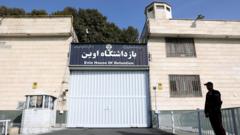The diplomatic landscape between Iran and Israel is complicated by conflicting communications on a newly announced cease-fire as missile strikes continue post-announcement.
**Cease-Fire Uncertainty: Iran Confirms Halt, But Hostilities May Continue**

**Cease-Fire Uncertainty: Iran Confirms Halt, But Hostilities May Continue**
Diplomatic tensions between Iran and Israel remain high as president Trump's cease-fire announcement raises skepticism amidst ongoing strikes.
On June 24, 2025, Iran's foreign minister confirmed a cease-fire with Israel shortly after President Trump announced a halt to hostilities, marking a potential turning point in the ongoing conflict. Despite Iran's agreement to cease military operations at 4 a.m. local time, the Israeli military did not immediately confirm the cease-fire, leading to confusion and continued missile exchanges soon after the announcement.
President Trump indicated that both nations would gradually "wind down" military missions over a period of a day. This claim came on the heels of significant military escalations on both sides, including airstrikes on Iranian nuclear facilities by U.S. forces and missile launches by Iran targeting U.S. military bases in the region.
The Iranian military, as communicated by Abbas Araghchi, asserted that operations against Israel were ongoing until the last moment before the cease-fire deadline, emphasizing the tense nature of the situation. Meanwhile, Israeli sources described unprecedented missile launches in the hours following the cease-fire announcement, suggesting that the military was prepared for continued conflict.
Diplomatic interventions from Qatar were reportedly instrumental in brokering the cease-fire discussions, with the emir of Qatar acting as a mediator between the U.S., Iran, and Israel. However, Israeli Prime Minister Benjamin Netanyahu's remarks suggested that Israel had not officially committed to a cessation of hostilities, raising questions about the unity of their response and commitment to de-escalation.
The economic ramifications of this conflict are also noteworthy, as oil prices fluctuated in response to the renewed hostilities and could potentially impact global markets in the long-term. Economic analysts noted the likelihood of increasing volatility in oil supplies, particularly through the critical Strait of Hormuz.
In response to the escalating situation, European diplomats and international organizations have expressed growing concern over the potential for further escalation and humanitarian crises, addressing the urgent need for renewed diplomatic efforts to resolve tensions in the region.
Moving forward, the situation remains fluid, with both sides grappling with the implications of the cease-fire proposal and its actualization amidst a backdrop of military action and geopolitical maneuvering.





















